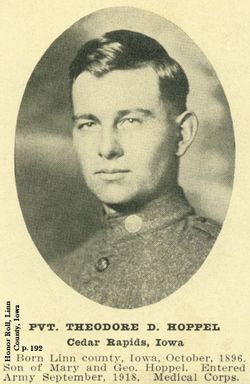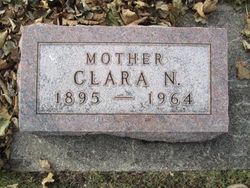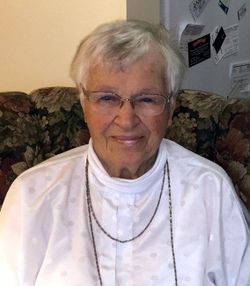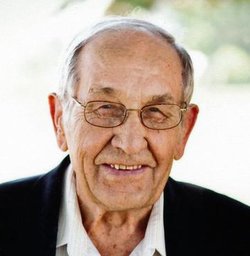| Description |
: |
After a long and healthy lifetime of faithful service to his Lord, his family and all those he encountered, Alfred Elmer Happel passed away early Monday morning, Jan. 25, 2021 at the Mill Pond Care Center in Ankeny, Iowa at age 93.
He was the third of seven children born to Theodore and Clara (Clausen) Happel on the family farm in rural Linn County near Cedar Rapids, on March 11, 1927, about six weeks shy of 94 years prior to his passing. Alfred was baptized at St. Stephens Lutheran Church in rural Atkins, Iowa. His parents were both born...
Read More
|
After a long and healthy lifetime of faithful service to his Lord, his family and all those he encountered, Alfred Elmer Happel passed away early Monday morning, Jan. 25, 2021 at the Mill Pond Care Center in Ankeny, Iowa at age 93.
He was the third of seven children born to Theodore and Clara (Clausen) Happel on the family farm in rural Linn County near Cedar Rapids, on March 11, 1927, about six weeks shy of 94 years prior to his passing. Alfred was baptized at St. Stephens Lutheran Church in rural Atkins, Iowa. His parents were both born in the 19th century a short time after their respective families emigrated from Germany. Both spoke German fluently and maintained a steadfast Christian faith. His father was a firm disciplinarian who taught Alfred the value of hard work. Meanwhile Alfred marveled that his equally diligent, kind-hearted mother was never heard to utter a word of complaint despite the many hardships and heartaches she endured. He recalled a simple life without electricity on that Depression-era farm where nearly all the family's food was raised, with the infrequent grocery trips to Cedar Rapids required only for ample supplies of flour and sugar. When power was finally connected at the farm a few years later, the Happel boys eagerly awaited darkness each night and the accompanying thrill of turning on the lights in the house. Farm implements were few, with ears of corn pulled from the stalks by hand as Ted Happel and the boys worked their way through the fields. The family dog, Lindy, was named for Charles Lindbergh, who had only recently piloted the first solo, nonstop transatlantic flight. And no parental chauffer was offered for the daily commute to St. Stephens Lutheran Elementary School near Atkins. Alfred and his brothers made the 4-mile trek each day via horse and buggy, going out at noon each school day to feed oats to the horse.
In 1938, the family moved to a farm near Latimer, Iowa, a transition made memorable to young Alfred primarily due to the adventurous truck ride. He was confirmed at St. Paul's Lutheran Church in Latimer shortly thereafter. The children shared in farm work but whenever time and the weather allowed, the boys loved playing baseball, a sport their father viewed favorably as well. Oldest son Richard often spent evenings listening to St. Louis Cardinals' games on the radio during a glorious era for the franchise in the 1930s-40s, a pastime quickly adopted by Alfred and younger sister Helen. It was a passion that was later righteously instilled in the siblings' children, who embraced their devotion to the Redbirds as part of their Happel heritage. Throughout high school and beyond, the boys spent many warm summer evenings after chores playing baseball on their own rural northern Iowa fields of dreams, small black-dirt diamonds fenced in by countless green rows of corn. Richard was an especially gifted first baseman, with Paul manning center field and Alfred at shortstop, with his well-worn, three-fingered Marty Marion-autograph glove on his left hand. Alfred also played basketball at Latimer, handling the center position at a lanky 6-foot-2, but the sport then was viewed primarily as an outlet for exercise until it was warm enough to play baseball again. Earning a starting spot on the basketball floor was not an especially distinctive achievement, given that his graduating class had only seven members, nearly half of them female. But the tiny rural school provided a rich educational experience for Alfred, who often spoke of his challenging but enlightening course in Latin.
Alfred had a vivid memory of a ping-pong game in December, 1941, that was interrupted by his father informing his sons of the attack on Pearl Harbor, although he had no sense of the coming war's impact on his own life. But when he graduated from high school in 1944, he was still only 17 due to bypassing kindergarten, and thus too young to serve. He had never envisioned a life off the farm but with brothers Richard and Paul already providing capable assistance, his father suggested Alfred look for work in Waterloo, where wartime employers were desperate for help. He was eagerly hired by Rath Packing Company where he worked through the winter. He left to help again on the farm briefly before returning to Waterloo for a job with Continental Bakery. But he turned 18 in March of 1945 and by April received his military draft notice. He joined the Army and completed basic training at Fort Riley, Kansas. While the war in Europe was ending, preparations for a massive invasion of Japan were underway, one that likely would have included Alfred were it not for the horrific atomic bombs that abruptly ended hostilities in August. Yet Alfred said he was too young to ponder the potential dangers that had loomed and too filled with the sense of adventure generated by his first-ever travels beyond Iowa's borders. He was later stationed at Fort Knox in Kentucky, then was assigned to serve with occupational forces in Italy. But perhaps his most remarkable wartime maneuver was convincing his military superiors to change their orders so he remained on the mainland. He later regretted his request, viewing it as a missed opportunity to see Italy without the hazards of combat and, to his dismay, was instead assigned to Fort Jackson in South Carolina, where he was a typing clerk, which he termed just punishment for a youthful error. He was discharged in March, 1947.
He initially gave little thought to a career path and took whatever jobs came along in postwar Waterloo, driving a truck for special deliveries for Carnation Dairy, toiling by the hot ovens at Wonder Bread Bakery, reading water meters for the city of Waterloo, and driving a 7-Up truck route to small towns in northeast Iowa. The one constant in his life, however, was having a church home. The son of the Lutheran minister at the Waterloo church he joined returned home one summer from his church-affiliated college, Valparaiso University in Indiana, prompting a friend to suggest he and Alfred take advantage of the G.I. Bill and attend there as well. The friend's primary motivation was seeking a wife, rather than a college degree, and dropped out after the first semester. But Alfred stayed four years, working part-time to support himself while taking classes and often traveling to watch Valparaiso basketball games, graduating in 1953 with a business degree.
Following graduation he took a job working with shippers for the Minneapolis and St. Louis Railroad Company in Chicago. It was a new world for Alfred. He lived in LaGrange, Illinois, riding the train to Union Station, then walking to work on Michigan Avenue, to his office on the 17th floor of the 38-story Continental Casualty building, stopping for breakfast at Walgreen's along the way. He occasionally also took the train to Comiskey Park to see White Sox games since they played at night, developing an affinity for the club, albeit a distant second to his love of the Cardinals. But one weekend in 1954 while back visiting his mother in Latimer, he was offered a position as hospital administrator for Hampton Lutheran Hospital and he returned home.
He and his brother Paul, like many young adults in the area, were regulars at the Surf Ballroom in Clear Lake on weekends, where the popular Jules Herman Orchestra from Chicago was regularly featured on Saturday nights. It was there that he met Norma Hanna, who was raised on a farm near Manly and was working at a bank in Mason City. They were married Sept. 23, 1956.
Before his marriage, however, he had quickly decided he was unqualified for the hospital job at his young age and resigned after 17 months, much to the disappointment of the hospital board. Lacking a Plan B, he migrated back to the familiar industrial surroundings of Waterloo to find a new position. However, on his way home to Latimer after a day of searching, he recalled there was an insurance company in nearby Waverly. He walked through the front door, unannounced, and encountered the president and an assistant of Lutheran Mutual Life Insurance Company. It was a small entity in 1955 and human resources protocols were less than rigorous. He was hired on the spot and he began work in policy service in January as the city became his family's home for the next 45 years. He soon was heading the department and later took on responsibility for the claims department as well, eventually serving as assistant vice president. What he viewed as one in a series of random opportunities in his life was, in fact, an ideal fit, allowing him to use his business and mathematical acumen but, more importantly, serve others in need. While some avoided the department because it required fielding complaints and dealing with uncomfortable situations, he said helping people was the best part of the job. He liked the fact that policy owners as well as company agents in 25 states across the country relied on him and if they had a problem, they knew to call Al at the home office.
He remained with the company as it dramatically grew, evolving into Century Companies of America before he took early retirement in 1988. The company is now part of CUNA Mutual. He took a part-time factory job with United Equipment in Waverly for two years before leaving the workforce.
While he and Norma raised their family in Waverly, he took on leadership roles at St. Paul's Lutheran Church, including a position on the church council. They sent their sons to St. Paul's Lutheran Elementary School. He was also a longtime member of the Waverly Kiwanis service club. They later joined Peace United Church of Christ. The family took many summer trips, cutting costs by eating cold summer sausage sandwiches and chips at lunch and towing the brown Starcraft pop-up tent trailer behind the Dodge station wagon, camping their way to sites as varied as the Smoky Mountains, Washington, D.C. , Yellowstone National Park and the Grand Canyon. Interspersed, of course, were pilgrimages to Busch Stadium in St. Louis for baseball games every few years and, countless hours of father-son time were spent attending local high school and college games, or watching games together on TV, in particular those involving the Iowa Hawkeyes. He seldom anticipated a successful outcome for the teams he pulled for, preferring the warm feelings of pleasant surprise that came from wins. But even more cherished were the random times of shooting baskets on the rusted hoop mounted on the wooden backboard above the cracked driveway as Alfred displayed his 1940s hook shot from any spot on the court, or simply playing catch in the front yard, still sporting the old three-fingered glove.
Alfred and Norma developed close friendships with neighbors as well, visiting across the back-yard wooden fence amid the endless yard work, venturing to small-town church suppers or Saturday night outings to the Clarksville Café with a stop afterwards at the popcorn stand for caramel corn. Alfred enjoyed visiting, the venue was irrelevant. A lesson he tried to often impress on his sons, with mixed results, was the importance of being friendly and taking an interest in others. Their social or professional status were insignificant to him but he was always eager to make a friend and would seek to direct conversations toward their interests. After any outing, he was always the last one to the car where Norma and the boys ranged from impatient to irritated as they waited, but invariably he'd arrive and cheerily announce that he just met someone who delivered mail near his family home in rural Franklin County or once baled hay for his uncle.
The family also developed a love of golf and were regulars on the gentle hills of the Waverly Golf and Country Club Course. In retirement, Alfred and Norma packed their clubs and made six-week stays each winter for many years at Myrtle Beach, South Carolina, savoring golf, the ocean view, coupons for specials at restaurants and Sunday sermons at First Presbyterian Church. He grew to appreciate the state which he had first entered with dismay during World War II.
In 2001 they moved to Clear Lake, near their family roots and to a home just a few blocks away from where they first met. They joined Zion Lutheran Church and were eager to continue serving others in retirement, both volunteering at the Opportunity Village General Store from 2002-12. Alfred took on additional volunteer duties as an advocate, working with Opportunity Village residents with disabilities. They continued to play golf for several more years as well but health limitations prompted them to move to Apple Valley Assisted Living in Clear Lake in late 2013 and as their health care needs grew, they moved to Mill Pond Care Center in Ankeny in 2017, near their children's residences, but retained their membership at Zion Church.
He was deeply devoted to Norma, and they spent nearly every hour with each other during retirement. When the pandemic forced their physical separation for a few months last year, he wrote letters to her daily. He was extremely proud of his family and considered himself richly blessed by his Lord. Looking back, he said, it was an interesting life.
Alfred is survived by his wife, Norma, of Ankeny and their children, Larry of Pella, Charles (Anne) of Lanesboro, Minnesota and Joel (Susan Oltrogge) of Ankeny. He is also survived by his brothers, Paul Happel of Hampton and Lester Happel (Alma) of Cedar Rapids and sister-in-law Dorothy Hanna of Manly. He was preceded in death by his parents, his older brother Richard and sister-in-law Lois, his younger sister Helen Jorgensen and brother-in-law Jim, his sister-in-law Kathy Happel, and his brother-in-law Jack Hanna, as well as his brother George and sister Elaine, who both died in childhood.
Due to safety restrictions necessitated by the global pandemic, a memorial service will be delayed until spring. Burial will follow at Memorial Park Cemetery in Mason City. In lieu of flowers, the family requests that memorial gifts in Alfred's name be designated to Hope Ministries in Des Moines or Self Help International in Waverly, charitable organizations seeking to assist others in building better lives and following Christ, as he strove to do. |






